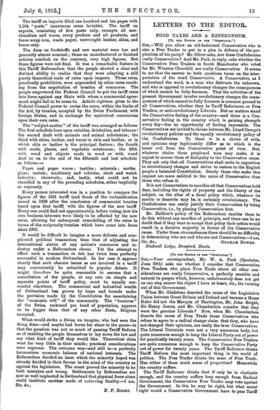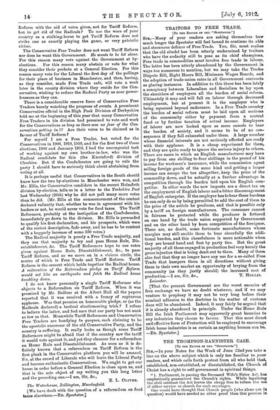[To Tea EDITOR Or THR " SPECTATOR:1 Sur,—Your correspondent, Mr.
W. A. Peck (Spectator, June 29th) asks me whether I consider that Conservative Free Traders who place Free Trade above all other con- siderations are really Conservative, a perfectly sensible and natural to quoque which, however, unfortunately does not get us one step nearer the object I have at heart, viz., the turning out of this Government.
When Mr. Gladstone deserted the cause of the Legislative Union between Great Britain and Ireland and became a Home Ruler did not the Marquis of Hartington, Mr. John Bright, Sir Henry James, and Mr. Chamberlain consider that they were the genuine Liberals P Now, when Mr. Chamberlain deserts the cause of Free Trade those Conservatives who refuse to agree to a radical change claim that they, who have not changed their opinions, are really the true Conservatives. The Liberal Unionists were not a very numerous body, but quite numerous enough to keep the Liberal Party out of power for practically twenty years. The Conservative Free Traders are quite numerous enough to keep the Conservative Party out of power for twenty years. The Tariff Reformer thinks Tariff Reform the most important thing in the world of politics. The Free Trader thinks the same of Free Trade. Has either of them much sense of proportion? Meanwhile the country suffers.
The Tariff Reformer thinks that if only he is obstinate enough, and the country suffers long enough from Radical Government, the Conservative Free Trader may vote against the Government. In this he may be right, but what moral right would a Conservative Government have to pass Tariff Reform with the aid of votes given, not for Tariff Reform, but to get rid of the Radicals? To use the woes of your country as a stalking-horse to get Tariff Reform does not strike one as exactly playing the game, or very patriotic either.
The Conservative Free Trader does not want Tariff Reform
nor does he want this Government. He wants to be let alone. For this reason many vote against the Government at by- elections. For this reason many abstain or vote for what they consider their pockets at a General Election. For this reason many vote for the Liberal the first day of the pollings for their place of business in Manchester, and then, having, as they consider, made Free Trade safe, will vote a week later in the county division where they reside for the Con- servative, wishing to reduce the Radical Party as near power- lessness as they can.
There is a considerable reserve force of Conservative Free
Traders keenly watching the progress of events. A prominent Conservative official in the High Peak Division of Derbyshire told me at the beginning of this year that many Conservative Free Traders in his division had promised to vote and work for the Conservatives so long as there was no fear of the Con- servatives getting in !!! Are their votes to be claimed as in favour of Tariff Reform?
For myself I am a Free Trader, but voted for the Conservatives in 1906, 1910,1910, and for the first two of these elections, 1906 and January 1910, I had the uncongenial task of working against my own brother-in-law, who was the Radical candidate for this (the Knutsford) division of Cheshire. But if the Confederates are going to rule the party I should have to seriously think about abstaining from voting at all.
It is perhaps useful that Conservatives in the South should know how the two by-elections in Manchester were won, and Mr. Ellis, the Conservative candidate in the recent Holmfirth division by-election, tells us in a letter to the Yorkshire Post last Wednesday (26th) why he did not poll many more votes than he did. (Mr. Ellis at the commencement of the contest declared valiantly that, whether he was in agreement with his leaders or not, he would never vote for food taxes. The Tariff Reformers, probably at the instigation of the Confederates, immediately go down to the division. Mr. Ellis is persuaded to qualify his first declaration, and his prospects, which were of the rosiest description, fade away, and he has to be content with a beggarly increase of some 330 votes.)
The Radical majority is purely a Free Trade majority, and
they use that majority to try and pass Home Rule, Dis- establishment, &c. The Tariff Reformers hope to use votes given against Home Rule, Disestablishment, &c., to pass Tariff Reform, and so we move on in a vicious circle, the centre of which is Free Trade and Tariff Reform. Tariff Reform is the cement which holds together the Radical house. A reiteration of the Referendum pledge on Tariff Reform would act like an earthquake and fetch the Radical house tumbling down.
I do not know personally a single Tariff Reformer who
objects to a Referendum on Tariff Reform. When it was promised by Mr. Balfour at the Albert Hall all the papers reported that it was received with a frenzy of rapturous applause. Was that promise an honourable pledge, or (as the Radicals declared) a tactical electioneering trick ? I refuse to believe the latter, and feel sure that our party has not sunk so low as that. Meanwhile Tariff Reformers and Conservative Free Traders are bandying is quoques, each claiming to be the apostolic successor of the old Conservative Party, and the country is suffering. It really looks as though some Tariff Reformers might be afraid that if the country saw the tariff it would vote against it, and yet they clamour for a referendum on Home Rule and Disestablishment. As soon as it is de- finitely known that a referendum on Tariff Reform is the first plank in the Conservative platform you will be amazed, Sir, at the crowd of Liberals who will leave the Liberal Party and become enthusiastic Conservatives. We ought to get our house in order before a General Election is close upon us, and that is the sole object of my writing you this long letter and the preceding one.—I am, Sir, &c.,
The Waterhouse, Bollington, Macclesfield. E. L. OLIVER.
I.We have dealt with the question of a referendum on food taxes elsewhere.—En. Spectator.]



















































 Previous page
Previous page